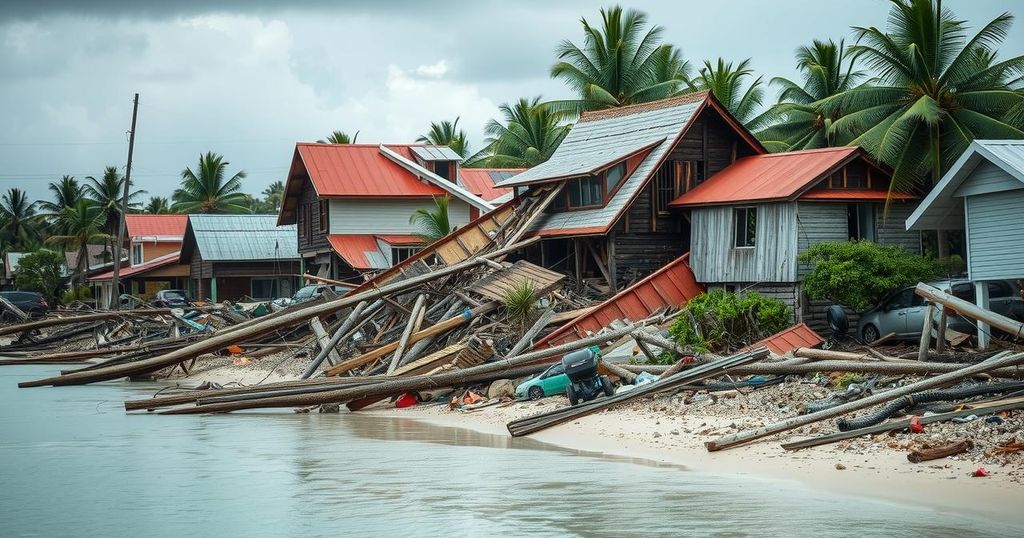World news
AFRICA, BRUNO RETAILLEAU, CAPE TOWN, DEATH TOLL, EMERGENCY RESPONSE, EMMANUEL MACRON, EUROPE, EUROPEAN UNION, FRANCE, FRANCOIS BAYROU, FRANÇOIS BAYROU, FRENCH INTERIOR MINISTRY, FRENCH WEATHER SERVICE, INTERIOR MINISTRY, MAYOTTE, NATURAL DISASTER, NATURAL DISASTERS, POPE FRANCIS, SOUTH AFRICA
Sofia Rodriguez
0 Comments
Cyclone Chido Devastates Mayotte, Leaving At Least 11 Dead
Cyclone Chido has caused extensive devastation in Mayotte, resulting in at least 11 fatalities and significant injuries. The cyclone has now moved towards Mozambique, where potential impacts on millions are anticipated. Aid authorities are mobilizing support to address immediate needs and structural damages while emphasizing the increasing severity and frequency of cyclones attributed to climate change.
At least 11 individuals have lost their lives due to the catastrophic effects of Cyclone Chido in Mayotte, a French territory in the Indian Ocean, as reported by France’s Interior Ministry. The cyclone has subsequently made landfall on the east coast of Africa, invoking serious concerns from aid organizations regarding potential additional casualties and extensive destruction in northern Mozambique. Current assessments indicate nine people are in critical condition within Mayotte’s hospital, with a reported 246 others also injured.
The French territory experienced a significant impact from the cyclone, which was described as the most severe in 90 years, with maximum winds recorded at over 220 kph (136 mph). The region’s public infrastructure, including the premier hospital and the airport, has sustained considerable damage, jeopardizing many residents, particularly those living in precarious conditions. Aid and rescue operations are underway, with 1,600 officers deployed to assist in mitigating potential looting and supporting affected populations.
Following Cyclone Chido’s destructive path, French President Emmanuel Macron is closely monitoring the situation, with Pope Francis extending prayers for the bereaved during his visit to Corsica. The cyclone’s progression into Mozambique poses further threats to millions in the affected regions, particularly Cabo Delgado and Nampula, with local emergency officials bracing for potential evacuations due to hazardous flooding conditions.
UNICEF has highlighted the severe infrastructural damage in Cabo Delgado, which may hinder access to essential services for weeks, stressing the urgent need for additional support to ensure continuity of care. The region has witnessed a rise in cyclone intensity linked to climate change, and efforts are ongoing to address the humanitarian implications faced by impoverished nations grappling with natural disasters initiated by global warming.
Cyclone season typically peaks from December to March, with recent years showcasing a troubling trend of increasingly violent storms affecting southern Africa. The region’s vulnerability underscores the pressing need for enhanced global cooperation to counter climate change repercussions on badly impacted communities.
Cyclone season in the southeastern Indian Ocean and southern Africa typically spans from December to March, often bringing about devastating consequences for vulnerable populations. Poor countries frequently bear the brunt of severe natural disasters like cyclones, despite contributing minimally to global climate change. The humanitarian crises resulting from these events have intensified calls for aid from developed nations. The recent Cyclone Chido has disrupted lives and infrastructure in Mayotte and Mozambique, mirroring the devastation caused by previous cyclones like Idai and Freddy in past years, which resulted in thousands of casualties. This trend highlights the increasing severity of cyclones, largely attributed to climate change, and emphasizes the urgent need for comprehensive support systems for affected nations.
Cyclone Chido has tragically resulted in at least 11 deaths in Mayotte, with considerable infrastructural damage reported, echoing the need for immediate aid and support. The cyclone’s wrath extends beyond Mayotte as it targets Mozambique, threatening millions of lives due to impending flooding emergencies. The urgency for international humanitarian assistance is accentuated by the perilous reality that impoverished territories continue to suffer devastating impacts from climate change-induced natural disasters. Hence, global participation and proactive measures are essential to alleviate the humanitarian crises emerging from such challenges.
Original Source: www.seattletimes.com




Post Comment